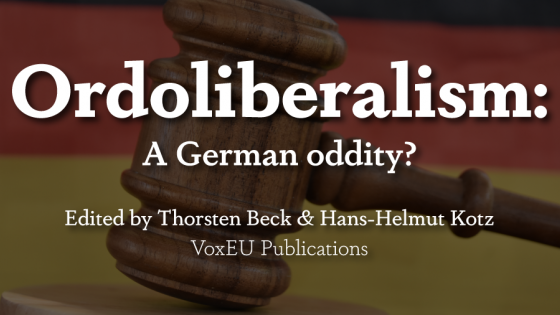German economics and, as a result, German economic policymaking, appear to be a land apart. Critics have even suggested that German policymakers and academics live in a “parallel intellectual universe”. The conflict, for example, with US economic policy pragmatism is a hardy perennial in international debates – dating back long before the most recent struggles in the G20 context. Similarly, the Eurozone crisis has opened fault lines between German economists and policymakers and those in a number of Eurozone (in particular periphery) countries. This column introduces a new eBook explaining the historical development of the ordoliberal school of economics and its influence on German policymaking, and contrasting it critically with what we like to call the Anglo-Saxon-Latin pragmatism of economic policymaking. The contributors come from a wide spectrum of economic schools of thoughts and include both academics and (former) policymakers that have had to directly deal with the consequences of these fault lines.
Download the new eBook here:
Ordoliberalism: Whence it came
A distinctive trait – an idiosyncrasy – of German economics post-1945 is its reference to Ordo, an economic policy approach developed by Walter Eucken (1952/1990) and colleagues at Freiburg University, in response to the malfunctioning, highly cartelised economy of the Weimar Republic as well as in opposition to the statist, authoritarian interventionism of the Nazi regime. Of chief concern was the protection of individual freedom. Competitive markets were seen as most effective in assuring the conditions for individual liberty, including the reining in of private market power.
In international debates, on the other hand, ordoliberalism is alluded to mainly with negative connotations, at times as an even more malicious version of the often-decried neoliberalism (Brunnermeier et al. 2016). However, ordoliberalism comes in a number of varieties. In its purest version, it stresses political or government failures and largely (almost completely) disregards market failures. Coordination issues are, however, in mainstream economics of course the reason for why “eschewing demand management policies” is seen as flawed. And, somewhat puzzlingly, ordoliberalism calls for a strong state, mainly to contain market power which in a pure “laissez-faire [environment ends up] distorting the market mechanism by crippling the price mechanism through private interventions”. The market is cherished as a power-reducing tool, in particular to contain influential special interests, within the framework of a competitive order and the rule of law. This is in obvious contrast to the Chicago School liberalism which “celebrates the ascendancy of private market forces (and) strives for a lean state…)”. Traces of this Ordo philosophy can be detected in EMU’s “framework of rules to ensure a sound fiscal policy and sound money”. But, then of course, those rules were honored in the breach, beginning with Germany (in 2003). Hence, ordoliberals hold that their principles were, in fact, never properly applied (Feld et al.) – probably rightly so. Alternatively, one can argue that the reference to ordoliberal principles is nothing but a mechanism to defend German interests as largest creditor in the recent sovereign debt and banking crises, as Charles Wyplosz holds. Ordo takes the backseat when national self-interest calls for: “Teutonomik trumps Ordnungsökonomik”, as Michael Burda points out.
The remaining chapters of the book focus on three different policy areas where the discrepancy between ordoliberalism and Anglo-Saxon-Latin pragmatism has become especially clear and relevant.
Principled monetary and financial policy: Underwriting stability
The ECB aims for a rate of increase of the harmonised consumer price index of below but close to 2%. This is, as Peter Praet stresses, perfectly in line with Eucken’s emphasis on the “primacy of monetary policy”. The ECB’s lexicographic ordering of its objectives – an unrivalled priority for price stability – also fits, hand-in-glove, with ordoliberalism’s insistence on a rule-based policy with a narrow mandate. Principles, however, do not suffice to develop the instruments needed to acheive the ultimate objective.
For ten years now, ever since the crisis broke, German media, but for rare exceptions, have treated its public with a highly skeptical assessment of ECB policy, based “on opinions expressed by many ordoliberal German economists”. Relentlessly predicting doomsday (hyper-inflation, vanishing foundations of wealth and political instability), this has sapped support for the ECB significantly (Adalbert Winkler). What matters for ordoliberals are principles – not the outcome (Wyplosz 2012). In this view, asymmetric information or market imperfections have no place. This, of course, also lays bare the limitations of a principles-based policy approach which, regardless of circumstances, prohibits any discretion.
What’s wrong with Eurozone?
Whereas the Global Crisis led to a similar hit to the Eurozone’s economy as to the US economy, recovery in the US case was much swifter. In addition, net exports were the major drivers of the EZ’s mediocre performance – remarkable for such a big and rather closed economic area, and certainly not an approach which could be mimicked by everybody (Oliver Landmann). Further, the crisis opened “new asymmetries”, challenging the EZ going forward. It is here that “conflicting narratives” about the appropriate design of policies come in.
On the one hand, the danger of excessive deficits, potentially “exacerbated by moral hazard from the anticipated likelihood of bailouts” was correctly acknowledged by ordos. But “rules that are too stringent to be credible can be worse than no rules at all” (Jeffrey Frankel). While explicit rules of the game are important, the EZ’s “management of discretion is a key weakness”.
On the other hand, largely ignoring demand-side effects has created larger, self-reinforcing output gaps in the EZ, deeper than was indicated, as correctly pointed out by the pragmatists (Ball 2014). And the fiscal straightjacket imposed by the Germans and other Nordic creditor governments on the EZ periphery left most of the macro-stabilisation task, i.e. demand-side macro management, at the ECB’s door.
Discretion, inexorably, comes with the temptation to re-optimise or to postpone, i.e. ‘kicking the can down the road’. It thus undermines the “liability principle” and ultimately the competitive system itself. If rules don’t rule, arbitrariness reigns supreme and gaming the system becomes the default option. This argument holds a fortiori in a federal system, as Harold James stresses: “The more federal a country is, the more it has to insist on rules.” But, by force of nature, rules cannot but remain incomplete, so the real issue is to negotiate “sustainable flexibility”.
Clearly, international policy coordination becomes difficult when views about how the world works diverge. However, such discrepancies are particularly problematic when they exist within a monetary union: forcefully insisting on a principled, rule-based approach is – as a rule – opposed by more pragmatic orientations, regularly defended by France and Italy. In fact, when push comes to shove, consider the response to the banking crisis, German politics can also become very pragmatic (Thorsten Beck and Hans-Helmut Kotz).
Global imbalances – coordinating with different script books
Ordoliberals regard current-account surpluses from the viewpoint of small open economies, which Germany might have been at some point, but the Eurozone certainly is not. In any case, for some, their quasi-permanent current-account surpluses make the Germans “bad, really bad”. However, as German observers (Clemens Fuest et al., Christoph Schmidt) point out, the surplus is driven by fundamentals (ageing society) or temporary factors (cheap domestic currency, low commodity prices). Almost half of the surplus, in accounting terms, can thus be explained by fundamentals (Philipp Steinberg). However, “competing over net exports is a zero-sum game”. For the same “reasons” of accounting a current-account surplus comes with net capital outflows (Richard Cooper). Within the EA, this implies adjustment without the security valve of a change in nominal exchange rates. Instead, migration, fiscal transfers or adjustment of relative prices – in particular real wages – have to do the job. A more expansionary fiscal policy as well as a stronger growth of wages, however, were anathemas in Germany (Jeromin Zettelmeyer, Agnès Bénassy-Quére). Instead, internal devaluation was asked from Germany’s partners (Christopher Smart).
Beyond the economic analysis, however, protectionist threats, uncertainty about a too large net creditor position as well as the EZ rules in the “macroeconomic imbalances procedure” should Germany lead to being more perceptive in terms of accepting calls for capping its surplus.
Where do we go from here?
In modern terms, the focus of ordoliberalism has been on microeconomic issues. Macro (stabilisation) policies, other than the stabilisation of the value of money, were seen of not much avail, if at all. In this regard, ordoliberalism shares a quite unconditional faith in the self-stabilising capacity of a market economy with the US freshwater schools of macroeconomics.
The Ordo school was – is – highly influential in German economics as well as, possibly more important, in politics and the public discourse. The post-WWII Wirtschaftswunder of the 1950s and 60s was understood as corroborating its analysis. Ordo philosophy also had a decisive impact on the institutional design of Europe’s economic community (in particular competition policy and prohibition of state aid) as well subsequently on its monetary union (think of the ECB’s mandate as well as the rule-based Stability and Growth Pact).
But in our second- (or third-) best world, markets are imperfect and fallible (as are public authorities, obviously). Contracts remain by necessity incomplete. Therefore, under certain circumstances, reasoned public intervention – discretionary judgement – is called for. This is, obviously, not a particularly German philosophy or American pragmatism. More plausibly, the Greeks – cf. Aristotle’s Nicomachean Ethics – can claim copyright on this.
References
Ball, Laurence (2014), 'Long-Term Damage from the Great Recession in OECD Countries', NBER Working Paper 20185, May.
Beck, Thorsten and Hans-Helmut Kotz (2017), Ordoliberalism: A German oddity?, Vox eBook, CEPR Press, London.
Brunnermeier, Markus K., Harold James, Jean-Pierre Landau (2016), The Euro and the Battle of Ideas, Princeton: Princeton University Press.
Eucken, Walter (1952/1990) Grundsätze der Wirtschaftspolitik, 6th Edition. Mohr Siebeck: Tübingen
Wyplosz, Charles (2012) 'Fiscal Rules: Theoretical Issues and Historical Experiences', in: A. Alesina and F. Giavazzi (eds) Fiscal Policy After the Crisis, Chicago University Press, 2012.



